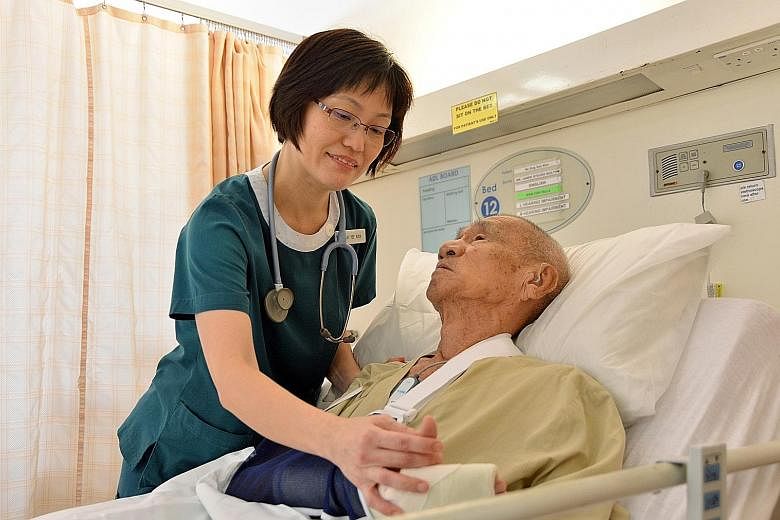Q I specialise in geriatric nursing because...
A I was close to both my paternal and maternal grandparents, who helped take care of me during my growing-up years.
I have developed an affection for older people over the years and am able to communicate well with them in their own dialect, including Teochew, Hokkien and Cantonese.
Q Our brain is fascinating because...
A It is the centre of our well-being.
It weighs 1,300g to 1,400g, is soft like jelly and, yet, it is such a powerful and complex organ with billions of neurons.
There are a lot of questions about the brain which researchers are still finding answers to.
Q What I do is like being...
A A detective who tries to solve the mystery of why elderly people fall ill. Many of them come to hospital with acute confusion when they are in pain, dehydrated or experience acute functional decline.
It is our responsibility to find out the causes for their confusion so that we can develop a person- alised care plan for them.
Q A typical day starts...
A When I reach the office around 7.30am. I may go through my e-mail or follow up on the clinical results for some of the patients.
-
Bio Box
-
MS TAY YEE KIAN
Age: 47
Occupation: Advanced Practice Nurse at National University Hospital (NUH)
Ms Tay found her vocation in part because of a comment by a doctor. After graduating in 1992 from Singapore General Hospital's School of Nursing, she was working at NUH, where a professor watched her with an elderly patient and told her: "You work well with old people."
She remembered this comment years later when she chose to go into geriatric nursing. She has not regretted this decision, "given its person-centred approach".
She helped set up a nurse-led Geriatric Assessment Clinic at NUH in 2004 and a Memory Clinic in 2006.
In 2014, she started a geriatrician-led transitional care programme called NUH-to-Home, to support frail, elderly patients with complex care needs who are discharged from the hospital.
She leads a team of home-care nurses who provide follow-up home visits for patients.
Her 49-year-old husband is self-employed and they have two children, aged 19 and 15.
This is followed by a meeting with my nurses at 8.30am to review the patients they have visited at home or patients with complex cases who need medical or nursing interventions.
I will then review patients who are referred for home care and look into their medical, nursing and other needs.
Twice a week, I will review patients with complex needs at their homes, to ensure a smooth and safe transition from hospital to home.
Once a week, I run an Advanced Practice Nurse clinic with the geriatrician. This is for geriatric patients with memory concerns.
Afternoons are usually filled with meetings and reviewing care processes for some of the initiatives I am leading. I usually leave the office at 6.30pm to have dinner with my family at home.
Q One little-known fact about growing old is...
A Memory loss, falls and incontinence are not part of normal ageing. They are caused by diseases and can be treated.
Q I come across all types of cases...
A From caring, dedicated families who give up their jobs to become full-time caregivers and sacrifice everything for their loved ones, to families who never visit their loved ones in hospital.
The latter will give many excuses, such as being busy, or they are simply uncontactable.
(Then there was) this elderly couple with no children. When the husband was hospitalised after a fall, his wife would take two buses to visit him daily, taking with her some of his favourite food. She would stay till late in the evening, before going home reluctantly.
Such loving acts always melt the hearts of nurses.
Q Things that put a smile on my face are...
A Watching elderly couples holding each other's hands, doing things together and supporting each other.
I admire elderly people who have a positive attitude towards life, who try to keep themselves active by exercising or simply doing things they like, such as dancing, singing or playing musical instruments.
Q Patients and families who get my goat are…
A Those who refuse to be part of the treatment-plan discussion and yet expect the healthcare team to bear full responsibility in treating and caring for them.
I always tell them that if they don't help themselves, no one can help them.
Q It breaks my heart when...
A Patients have no caregivers despite having many children. It pained me to hear a son say that his money was for his children's education and not for his parents.
Q I wouldn't trade places for the world because...
A I have a blessed family. I love being a professional nurse, which is very meaningful and rewarding.

